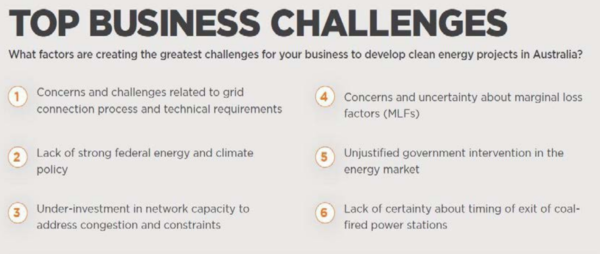Outcomes of Friday’s COAG Energy Council meeting, conducted via teleconference, have been largely well received by the energy industry in an atmosphere of co-operation and support for consumers, as evolving measures to control the spread of COVID-19 severely impact individuals and businesses around Australia.
Kane Thornton, Chief Executive of the Clean Energy Council tweeted after the meeting: “COAG Energy Council understandably focused on COVID-19 response. But good to see progress with Renewable Energy Zones, actioning ISP & referring COGATI to post-2025 market design process. All sensible.”
Thornton and the CEC had sent a letter and briefing to COAG ministers ahead of the meeting, presenting six recommendations for actions that the council could take to support “continued deployment of renewable energy and energy storage”, as “critical to replacing Australia’s ageing coal-fired generation, delivering lower prices and a reliable energy system and achieving Australia’s emission reduction targets”.
A COAG communique reporting on the meeting of ministers first emphasised the expectation that energy generators, retailers and networks would consider “support measures for customers experiencing difficult circumstances as a result of COVID-19”, and also focused on ensuring reliability and security of the grid in advance of the coming summer of 2020-21.
Federal Minister for Energy and Emissions Reduction, Angus Taylor said in a post-COAG statement , “governments and industry are working closely together to make sure there is no disruption to energy supplies”.
The Australian Energy Market Operator had on Friday already enacted a full suite of pandemic responses to meet energy market demand despite threats to its workforce health and ongoing challenges to the grid.
Turning up the heat on the Retailer Reliability Obligation
Among COAG Council actions taken to this end was agreement to implement a significant tightening of the Retailer Reliability Obligation (RRO), which has for some time been debated.
Australia’s reliability standard, previously conformed to a benchmark of 0.002% of unserved energy (customers going without power due to outages) across the National Electricity Market (NEM) in any year.
The standard was last breached in 2009, due to the impact of drought on power supply, and is considered among the most stringent in the world, but recent heat-waves and unprecedented circumstances affecting the NEM prompted ministers at the last COAG meeting to request that the Energy Security Board review the standard.
Review findings led ministers on Friday to agree to implement strengthening of the standard, to limit “unserved energy to no more than 0.0006% in any region in any year”.
This measure will be accompanied by the creation of new “triggers” under the Retailer Reliability Obligation to invoke the stricter standard, alongside the setting of a new “out-of-market” capacity reserve to ensure the tighter standard can be met.
Considered advocacy gets mixed results
Of the six recommendations made by the CEC, some were addressed at least in part, while others, such as review of governance of DER standards; accelerating reform of stand-alone power systems for bushfire recovery; and implementing further review of the Marginal Loss Factor (MLF) regime, did not get a look in.
A recent review by the Australian Energy Market Commission (AEMC) of the rules governing MLFs — a system that accounts for electricity losses as generation is transported via transmission infrastructure — opted to retain the existing methods of calculation, which have severely and often unpredictably impacted revenues of wind and solar generators, resulting in losses of up to 25% of individual asset incomes.
In its recommendation to COAG, the CEC said it had expected the review to “consider how losses could be shared by generators in a way that presents less volatility and more manageable risk, without increasing consumer costs,” and without ignoring actual physical losses.
It had therefore urged the COAG ministers to instigate a fresh review of the loss factors framework with the aim of “better protecting generator investments once they become operational” — to no apparent avail.

Table: Clean Energy Council
ISP inspires some to-do
More in line with CEC recommendations, were the ministerial meeting’s discussions in relation to the Australian Energy Market Operator’s (AEMO) Integrated System Plan (ISP) and implementation of Renewable Energy Zones.
The CEC recommended that the Council endorse the ESB’s recent proposed rule change to action the ISP in relation to transmission investment and build, a process governed by the slow-moving Regulatory Investment Test for Transmission (RIT-T)
Ministers agreed to rule changes that support implementation of the ISP, but as the CEC noted in its briefing, there is scope for further improvement to the RIT-T, “such as around recognising the broader potential customer benefits” that would flow from accelerating build out of transmission capabilities in the NEM.
At the COAG Energy Council meeting in November 2019, the ESB was tasked with delivering a recommended rule framework for actioning the Integrated System Plan to the Council meeting last week. But on Friday it was decided that, “Suggestions for further work should be made to enable COAG Energy Council to consider appropriate fair cost allocation methodology for transmission by September 2020.”
Who pays must also win
Allocation of costs was also a strong theme of the CEC briefing on supporting the development of Renewable Energy Zones (REZ) “as a means to achieve scale efficient generator connections”.
The CEC asked the ministers to consider not just enhanced transmission for REZs, of which the NSW Central-West REZ is expected to be the first, but the provision of a range of other benefits to participating generators such as:
- System-strength enhancements, including the potential for shared energy storage
- A streamlined and prioritised connection process
- Streamlined planning and environmental assessments
“New generators are not opposed to paying to access REZ benefits,” said the CEC on behalf of its members, “but consideration should be given to arrangements to share the cost of new transmission between generators, speculative investors and consumers”.
The post-meeting ministerial communique simply states that attendees discussed REZs and requested that rule changes be developed to implement renewable energy zones.
CoGATI is not a fast car
Thornton, who was unavailable for comment today, had already expressed industry approval last week of a pre-COAG decision to defer consideration of reforms to the contested Coordination of Generation and Transmission Investment (CoGATI) framework until it can be integrated into the ESB’s post-2025 market review.
The CEC briefing said, “The clean energy industry had serious concerns about the previous proposal,” because it would introduce “significant complexity and risk into the market with limited benefit.” COAG ministers also approved of the deferral.
Coordination, a promising concept
After no formal co-ordination between COAG ministers for almost a year prior to the November 2019 Energy Ministers meeting, and a four-month gap before the most recent meeting on Friday, the COVID-19 crisis has prompted initiation of an Energy Coordination Mechanism, which will bring together senior executives from governments and industry on a weekly basis for the duration of the health emergency.
“Ministers noted there need to be continued engagement between government and industry across the energy sector … to ensure the energy sector continues to support the economy and community,” said Friday’s post-meeting communique.
Even as states now close their borders to in-country travellers as part of efforts to slow the spread of the virus, the Energy Coordination Mechanism holds promise for keeping ministers engaged in integrated responses to the country’s energy-reliability and transition needs
This content is protected by copyright and may not be reused. If you want to cooperate with us and would like to reuse some of our content, please contact: editors@pv-magazine.com.









By submitting this form you agree to pv magazine using your data for the purposes of publishing your comment.
Your personal data will only be disclosed or otherwise transmitted to third parties for the purposes of spam filtering or if this is necessary for technical maintenance of the website. Any other transfer to third parties will not take place unless this is justified on the basis of applicable data protection regulations or if pv magazine is legally obliged to do so.
You may revoke this consent at any time with effect for the future, in which case your personal data will be deleted immediately. Otherwise, your data will be deleted if pv magazine has processed your request or the purpose of data storage is fulfilled.
Further information on data privacy can be found in our Data Protection Policy.